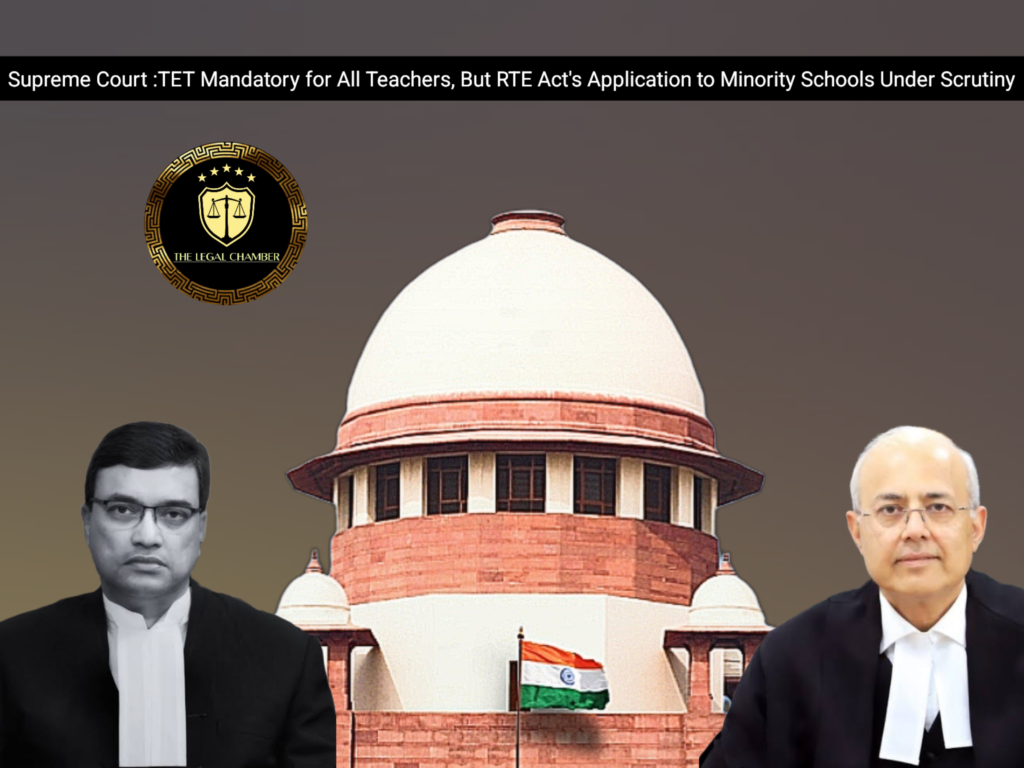
This Supreme Court judgment holds that the Teacher Eligibility Test (TET) is a mandatory qualification for the appointment and promotion of all teachers under the RTE Act. However, the Bench expressed doubts about the correctness of the precedent in Pramati which exempts all minority institutions from the RTE Act, and has referred this specific constitutional question for reconsideration by a larger bench.
Facts Of The Case:
This set of civil appeals originated from conflicting judgments of the Bombay and Madras High Courts concerning the applicability of the Right of Children to Free and Compulsory Education (RTE) Act, 2009, and specifically the Teacher Eligibility Test (TET), to minority educational institutions. The appellants included minority educational institutions, state authorities, and individual teachers. The minority institutions challenged government resolutions and notifications that made qualifying the TET a mandatory precondition for appointing teachers, arguing it infringed upon their rights under Article 30(1) of the Constitution. Conversely, state authorities contended that the TET was essential for maintaining teaching standards across all schools. A separate batch of appeals involved in-service teachers, appointed long before the RTE Act came into force, who contested the requirement to pass the TET for their promotions and continued service. The legal landscape was governed by the Constitution Bench precedent in Pramati Educational and Cultural Trust (2014), which had held the entire RTE Act inapplicable to minority institutions, whether aided or unaided. The Supreme Court was thus tasked with deciding whether to insist on the TET for minority institutions and for the promotion of experienced in-service teachers, which necessitated a fresh examination of the scope of Article 30(1) and its interplay with the right to education under Article 21A.
Procedural History:
The procedural history of this case involves multiple streams of litigation originating from the High Courts of Bombay and Madras. Minority educational institutions, individual teachers, and state authorities filed various writ petitions challenging or defending the mandatory nature of the Teacher Eligibility Test (TET) for appointment and promotion. The Bombay High Court, in one impugned judgment, upheld the TET requirement for minority institutions, while the Madras High Court, in a different set of judgments, largely exempted them based on the precedent set by the Supreme Court’s Constitution Bench in Pramati Educational and Cultural Trust (2014). These conflicting outcomes led to the filing of the present civil appeals before the Supreme Court, which were tagged and heard together. The Supreme Court, after hearing extensive arguments, reserved the matter for judgment and has now delivered its ruling, which includes referring the core constitutional question regarding the applicability of the RTE Act to minority institutions to a larger bench for reconsideration.
READ ALSO:Supreme Court Rules :Procedural Lapses Can’t Be A Safe Haven For Rapists
Court Observation:
The Court made several critical observations, expressing profound doubt that the blanket exemption of all minority institutions from the entire RTE Act, as established in the Pramati precedent, was correctly decided. It observed that this sweeping exclusion, based solely on the potential conflict of Section 12(1)(c) with Article 30(1), was disproportionate and legally suspect, as it failed to analyze how other provisions of the RTE Act—such as those mandating teacher qualifications and infrastructure—infringed upon minority rights. The Bench emphasized that Article 30(1) does not confer absolute immunity from regulation and must be harmoniously construed with the fundamental right to education under Article 21A, which is foundational for a child’s development. Furthermore, the Court firmly held that the Teacher Eligibility Test (TET) constitutes a mandatory minimum qualification under Section 23 of the RTE Act, applicable for both appointment and promotion of teachers, as it is essential to uphold the quality of education, which is a core component of the right under Article 21A.